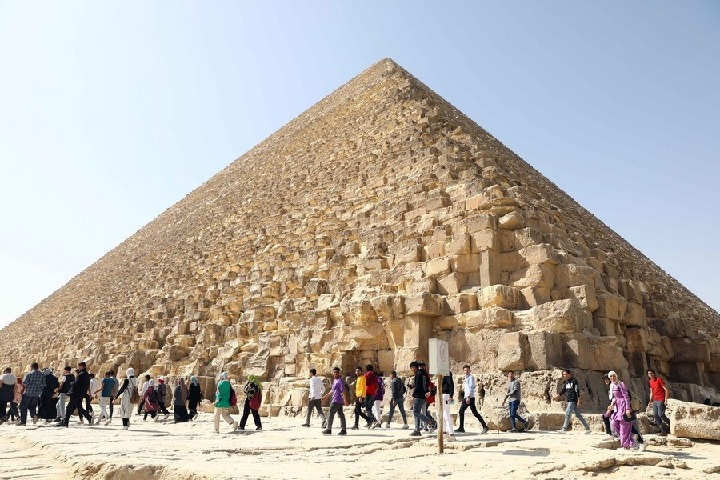Hidden corridor discovered in Great Pyramid of Giza

Cairo, March 3: The Egyptian government has announced the discovery of a hidden 9-metre-long and 2.10-metre-wide corridor behind the 4,500-year-old Great Pyramid of Giza, known as Khufu Pyramid, which "will lead to further findings".
Addressing a press conference on Thursday, Minister of Tourism and Antiquities Ahmed Issa said that "the discovery is a result of the international 'ScanPyramids' project that was launched in 2015 by the Ministry of Antiquities to study the structure of the pyramids without using harmful drilling methods", reports Xinhua news agency.
"It will lead to further findings," he added.
An international team, consisting of experts from Egypt, France, Germany, Canada, and Japan, has been working on analyzing a cavity behind the pyramid's north face that was first discovered in 2016, he added.
Scientists used non-invasive and non-destructive surveying techniques called muons radiography.
Also addressing the same press conference, Mostafa Waziri, head of the Supreme Council of Antiquities, said that the unfinished corridor was likely created to redistribute the pyramid's weight around either the main entrance now used by tourists, almost seven meters away, or around another as yet undiscovered chamber or space.
"We're going to continue our scanning so we will see what we can do ... to figure out what we can find out beneath it, or just by the end of this corridor," he added.
Five rooms atop the king's burial chamber in another part of the pyramid are also thought to have been built to redistribute the weight of the massive structure, he said, adding that it was possible the pharaoh had more than one burial chamber.
The Great Pyramid of Giza is the last of the Seven Wonders of the Ancient World that is still standing today.
It was constructed as a monumental tomb around 2560 BC during the reign of the Pharaoh Khufu, or Cheops.
Built to a height of 146 meters (479 feet), it now stands at 139 meters and was the tallest structure made by humans until the Eiffel Tower in Paris in 1889.
Addressing a press conference on Thursday, Minister of Tourism and Antiquities Ahmed Issa said that "the discovery is a result of the international 'ScanPyramids' project that was launched in 2015 by the Ministry of Antiquities to study the structure of the pyramids without using harmful drilling methods", reports Xinhua news agency.
"It will lead to further findings," he added.
An international team, consisting of experts from Egypt, France, Germany, Canada, and Japan, has been working on analyzing a cavity behind the pyramid's north face that was first discovered in 2016, he added.
Scientists used non-invasive and non-destructive surveying techniques called muons radiography.
Also addressing the same press conference, Mostafa Waziri, head of the Supreme Council of Antiquities, said that the unfinished corridor was likely created to redistribute the pyramid's weight around either the main entrance now used by tourists, almost seven meters away, or around another as yet undiscovered chamber or space.
"We're going to continue our scanning so we will see what we can do ... to figure out what we can find out beneath it, or just by the end of this corridor," he added.
Five rooms atop the king's burial chamber in another part of the pyramid are also thought to have been built to redistribute the weight of the massive structure, he said, adding that it was possible the pharaoh had more than one burial chamber.
The Great Pyramid of Giza is the last of the Seven Wonders of the Ancient World that is still standing today.
It was constructed as a monumental tomb around 2560 BC during the reign of the Pharaoh Khufu, or Cheops.
Built to a height of 146 meters (479 feet), it now stands at 139 meters and was the tallest structure made by humans until the Eiffel Tower in Paris in 1889.